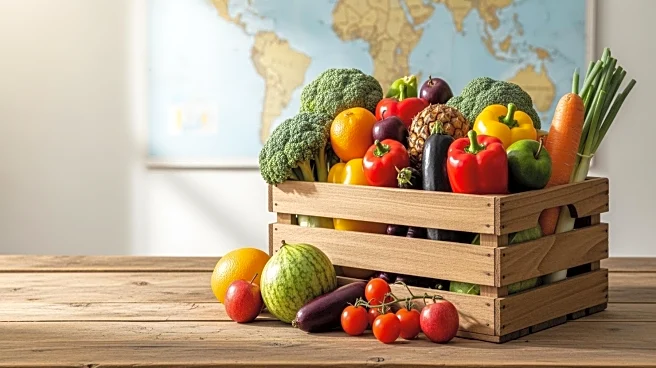What's Happening?
American agriculture is heavily reliant on global markets, with approximately 20% of U.S. agricultural production exported annually. Trade policy is crucial for maintaining economic health and supporting
jobs across the agriculture supply chain. President Trump's administration has been addressing longstanding trade challenges, including tariff and non-tariff barriers, through negotiations like the U.S.-Mexico-Canada Agreement (USMCA). However, the U.S. faces increasing competition from countries like China, which have advanced in trade relationships and economic influence. The agriculture trade deficit is worsening, putting American farmers in a difficult position despite their productivity.
Why It's Important?
Trade policy is vital for the U.S. agriculture sector, which produces more than the domestic market can absorb. Open and predictable access to international markets is necessary to capitalize on this surplus and maintain a robust food supply chain. The U.S. must strengthen regional ties and engage with fast-growing markets in Asia and Africa to secure food supplies and sustain economic resilience. Transparent, science-based standards and fair trade rules are essential to ensure American farmers can compete globally. The administration's efforts to correct past trade policy mistakes and confront unfair practices are crucial for building a stronger trade policy.
What's Next?
The U.S. is expected to deepen its engagement with emerging markets and push for fair trade practices. The administration will likely continue leveraging trade negotiations to address barriers and enhance market access for American agriculture. Ensuring compliance and enforcement of trade agreements will be key to maintaining competitive advantages. Stakeholders, including government and industry leaders, will need to collaborate to support American producers and address the challenges posed by global market shifts.
Beyond the Headlines
The focus on trade policy highlights the broader geopolitical dynamics affecting agriculture. As countries vie for economic influence, trade agreements become tools for diplomacy and strategic partnerships. The emphasis on science-based standards also underscores the importance of innovation and sustainability in agriculture, which could drive long-term shifts in production practices and environmental impact.










